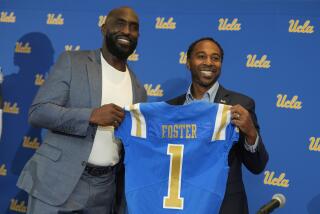Jarman: Artist, Activist and Iconoclast : Appreciation: The director was admirable as a filmmaker for the risks he always took and as a man for his outspoken advocacy of gay rights.
- Share via
Britain’s iconoclastic Derek Jarman, who died Saturday at 52 from AIDS complications, made the kind of films you either loved or hated. His experimental work confounded and often outraged audiences with their surreal style and frank eroticism. He is perhaps best known for his most recently released film, the 1992 “Edward II,” his most accessible work, a modern-dress version of Christopher Marlowe’s Elizabethan tragedy. Jarman transformed the monarch’s scandalous, ill-fated affair with a handsome courtier into a timely, fiery attack on homophobia.
Only three other of his pictures have received local theatrical releases: “Sebastiane” (1978), about the life of a martyred saint in which everyone speaks Latin; “Caravaggio” (1986), his highly innovative biography of the 16th-Century Italian painter; and “War Requiem” (1990), in which Jarman accompanied Benjamin Britten’s oratorio with a flow of anti-war imagery, presented as reminiscences by a World War I veteran (Laurence Olivier, in a fitting screen farewell).
Jarman was consistently admirable as a filmmaker for the risks he always took and as a man for his outspoken advocacy of gay rights. Although Jarman never made a remotely commercial movie in his career of more than 20 years, he commanded the front pages of all three of London’s “serious” papers on the occasion of his death, a tribute to the impact of his high-profile activism far more than his bold artistry. Jarman did not have the same celebrity in America, but was nonetheless deeply admired by gays--in England he was even called “Saint Derek”--and by sophisticated filmgoers; for all their gay sensibility, Jarman’s films were never aimed exclusively at gay audiences.
In person, Jarman, who came to Hollywood in May, 1992, to promote “Edward II,” proved to be in many ways much more the traditional Englishman than his films would ever suggest him to be, and he described himself as the product of a supportive “suburban family.” He was a warm, open, good-looking man of much wit and typically impeccable British manners.
*
Diagnosed with HIV in 1986, he went public with his health status in 1987; by 1990 he had already rebounded from tuberculosis of the liver and temporary blindness and had resumed his career. He said that even before his own diagnosis, AIDS, to which he had lost many friends, began to shape his work.
“War Requiem” was preceded, for example, by his apocalyptic “The Last of England” (1987), envisioning a Britain after the fall of government, and followed by the even more dazzlingly surreal “The Garden” (1991), in which the story of Christ is juxtaposed with the fate of a pair of young gay lovers, who are also crucified. Jarman went on to complete “Wittgenstein,” a fiercely demanding account of the life of the philosopher that unfolds in tableaux, and “Blue,” in which the only visual image is an unchanging blue screen, a metaphor for Jarman’s virtual blindness; its soundtrack is structured around his illness.
*
From the start, Jarman, who began as a painter and was a production designer for Ken Russell’s “The Devils” (1971) and “The Savage Messiah” (1972), was plunged into censorship battles, beginning when Channel 4, England’s minority TV channel, announced plans to air “Sebastiane” and his next film, “Jubilee,” which was an exceedingly free adaptation of “The Tempest.” He caused an international uproar in 1991 when in a letter to the Guardian newspaper he criticized Ian McKellen, an openly gay actor, for accepting a knighthood from the Tory government, which under Prime Minister Margaret Thatcher passed an act forbidding local government funding of activities thought to “promote” homosexuality.
Jarman in turn was criticized by 18 individuals prominent in the British arts, who publicly declared their own homosexuality in support of McKellen. “The whole thing was rather like the Nazis giving an Iron Cross to a rabbi for saving Jews,” remarked Jarman with characteristic sharpness. “Ian was co-opted, like all Shakespearean actors are. It is, after all, the Royal Shakespeare Company! Ian is a very nice man, and he’s very put out with me, but somebody had to stand up and not be counted.”
*
Free-lance writer David Gritten in London contributed to this report.
More to Read
Only good movies
Get the Indie Focus newsletter, Mark Olsen's weekly guide to the world of cinema.
You may occasionally receive promotional content from the Los Angeles Times.










